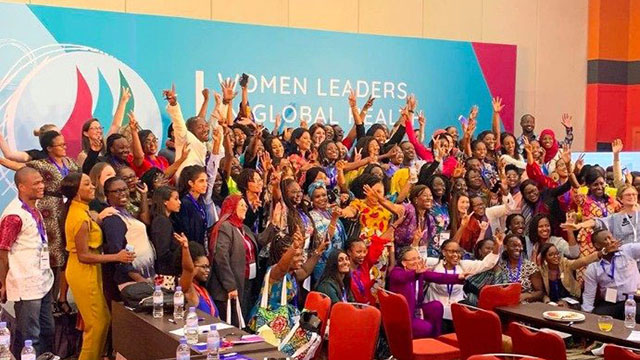
Pictured above: The Women Leaders in Global Health conference in Rwanda.
Earlene Avalon was thrilled. In her first trip to Africa for the third annual Women Leaders in Global Health conference, not only did she meet Zoleka Mandela, Nelson Mandela’s granddaughter, but also leading international health equity hero and Partners In Health co-founder Paul Farmer. The First Lady of Rwanda and Her Royal Highness of Jordan were also guest speakers.
The conference, held from November 9–10, 2019 in Rwanda, celebrated women in leadership roles and connected leaders from around the world to work toward gender equity in the field of global health.
Avalon, Assistant Professor and Lead Faculty of the Health Management and Health Science programs, first got involved with the conference when, as a volunteer at Brookline High School, she brought a group of students from the school’s African American and Latino Scholars program to the Global Health Film Festival in London in 2017. There she met Dr. Agnes Binagwaho, the former Minister of Health for Rwanda, and they kept in touch. Binagwaho invited Earlene to lead a mentoring session at the conference, held at the University of Global Health Equity where Binagwaho was Vice Chancellor and Chief Executive.
Avalon was particularly moved by Zoleka Mandela’s personal story about surviving breast cancer, and its implications regarding healthcare inequity. “Her discussion was really on access,” she says. “Mrs. Mandela shared that because of her privilege she had access to various lifesaving healthcare services. She challenged that audience to think about what that means for women and their families who do not have the same resources she does in terms of access to cancer treatment. That was really powerful to me,” Avalon says, “because a lot of those same issues are currently being played out here in the United States in terms of who has access to what treatment. It can be financial, it can be race, it can be gender, it can be geographical diversity – so there were definitely a lot of similarities there.”
Avalon’s mentoring group included recent medical school graduates, seasoned physicians and members of graduate programs in other clinical disciplines, all of whom were particularly interested in global health and leadership. “Many of the women are already practicing clinicians across the globe, but they wanted to get into healthcare leadership and policymaking. They want to be part of the decision-making process,” Avalon says. “And so I provided insight in terms of how I was able to move up through the ranks in healthcare, and suggestions they might want to consider as they continue to advance and develop their careers.”
Since the group included women from all over the world, “it was fascinating just to hear about some of the cultural differences of women practitioners and healthcare leaders, and some of the challenges they face in their respective countries in terms of either their gender, their ethnicity or even class,” Avalon says. “We took time to get to know each other, to understand some of those unique differences.”
Avalon created an online community for the group to continue to connect after the conference was over. She likes to use the term “mentoring circle.” “We created our own ‘support village’ for each other, because often [these women] felt really alone or isolated. The further they advanced, the more isolated and alone they became,” she says. “Knowing they have this supportive group of women throughout the world who are caring for them – who are cheering them on – who are rooting for their success – has just been tremendous.”
After returning home, Avalon thought about ways to bring her conference experience into the classroom. She believes it’s important for students to be aware of the work their professors are doing outside the university walls. “Often students see us as educators, but not necessarily see us in practice. So I’m always trying to bring in those real-life experiences,” she says.
Sharing these experiences with her Northeastern undergraduate students, Avalon believes, will encourage them to broaden their view of public health to a global perspective. “Expanding our understanding of some of the health implications on an international level can really help us look at what we can do to improve our communities,” she says. Reflecting on how Partners In Health was created, she adds, “People from all different disciplines have to work together to improve our world and make it a better place for future generations. That’s one of the things I’m hoping to teach my students.”
She also helps her students look ahead to their own futures. “Oftentimes, you’re in the midst of going to school, or working or raising a family, and it’s hard to imagine the possibilities out there,” Avalon says. “As an educator, I’m always trying to help students imagine where they could be in five years, 10 years, 15 years as a result of using networks and connections – and more importantly, stepping outside their comfort zone to learn new things and explore new opportunities.”
Avalon’s students are grateful for her encouragement. As Health Management student Leala Tanous enthused upon learning about Avalon’s involvement in the conference, “This is so inspiring! It feels good to know someone who makes such a difference in our world!”